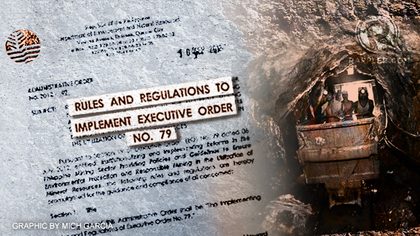SUMMARY
This is AI generated summarization, which may have errors. For context, always refer to the full article.

MANILA, Philippines – To accommodate changes proposed by the mining council, the government suspended on Friday, September 28, the implementing rules and regulations (IRR) of the government’s mining policy, or Executive Order 79.
The IRR was supposed to be implemented tomorrow, Saturday, September 29, or 15 days after the new rules were published last September 14. This particular IRR was released after President Bengino Aquino III signed EO 79 on July 9.
However, on September 24, the President convened the mining council tasked to draft the IRR — days after large and medium mining firms called some of the IRR’s provisions “patently illegal.”
On the same day, Malacañang announced that the mining council agreed to revise some of the contentious provisions to appease the industry and avoid a court battle.
Among the contentious provisions are the term of the mining contract, the definition of areas that will be barred for mining activities, and the award or processing of new mining contracts.
But the mining firms said the mining council failed to consult stakeholders for these revisions and that it inserted some provisions without checking if these violate the existing Mining Act. It is not clear what these particular revisions are.
Contract renewals
While the IRR is in a limbo, the government gave assurances that mining contracts that will expire on the days when no policy or rules are still in place would be attended to.
Mines and Geosciences Bureau (MGB) Director Leo Jasareno said, however, that mining tenements covered by these expiring contracts will not be automatically renewed.
Instead, these will be bid out.
Jasareno said the amended IRR provides that if the government and a mining company do not reach an agreement on the renewal of the Mineral Production Sharing Agreement (MPSA), this would be submitted to a bidding.
In the absence of any agreement, other mining firms can bid to obtain the MPSA.
“If (the MPSA) expires, you can file an application for renewal. The firm will sit down with the government to reach an agreement on the renewal. But, if they do not reach an agreement, the mining contract will be considered expired. The renewal of the mining contract will be done through a bidding process,” Jasareno explained.
The mining chamber said the rules remain “ambiguous” and asked the Palace and the mining council to clarify them.
The government however said it hopes the revisions will address various groups’ concerns. – Rappler.com
Read the Blog on the 2012 Mining Conference for a blow-by-blow account of issues being discussed.
For the existing mining contracts in the Philippines, view this #WhyMining map.
How does mining affect you? Are you pro or against mining? Engage, discuss & take a stand! Visit Rappler’s #WhyMining microsite for the latest stories on issues affecting the mining sector. Join the conversation by emailing whymining@rappler.com your views on the issue.
For other views on mining, read:
| Yes to Mining | No to Mining |
More on #WhyMining:
- Shaping the future of mining
- EO: No new mining contracts
- The Mining EO: A mixed bag
- Mining E.O. not perfect, but very good
- CONVERSATIONS: What are your thoughts on the mining EO? #WhyMining
- Mining E.O. pits gov’t vs local execs
- Correcting lies and disinformation
- Stand for the environment
- How can mining work for Philippines?
- Mining is a social justice issue
- REPLAY: #WHYMINING
Add a comment
How does this make you feel?
There are no comments yet. Add your comment to start the conversation.